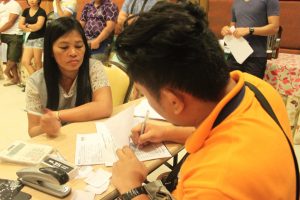
 FOR her, life has always meant living in Boracay Island. It revolved in her work as a laundry attendant in a hotel.
FOR her, life has always meant living in Boracay Island. It revolved in her work as a laundry attendant in a hotel.
Nanay Lucille Tulagan, now a widow, has moved in the island nine years back. She brought her three children, sent them to school and saw to it that the elder two land a job. The third one is still in college.
With the temporary closure of the island, however, Nanay Lucille decided that they go to Pangasinan for survival. It is the place of her late husband. It would all be a new life for her and the children, far different from her life as staff of Best Western Boracay Tropics.
“We will see what we can do there to survive while waiting for the hotel to call me back,” she said.
Nanay received a P3,000 transportation assistance from DSWD Field Office VI. She said her children, the two of whom work in restobars in the island also, will be going home with her.
“I told them to avail of DSWD assistance too. It will be helpful at least when we travel,” she said.
As of 9p.m. of April 25, the DSWD has released P502,300 in transportation assistance to 280 workers.
“We will be jobless for six months. This brings a feeling of relief. At least we have money to travel back to Pangasinan,” she said.
The DSWD has started its Operation Center in the Island since April 7.
Most of the clients expressed the need for cash so that they could go back home.
Some sought counseling help.
Earlier, DSWD Regional Director Rebecca P. Geamala said, “We will immediately provide the transportation needs. But we will not leave them from there. We will refer and monitor them in the places where they will be going to ensure a holistic approach to their cases.” she said.
Geamala also said that Cash for work, Sustainable Livelihood Program and regular programs and services will be implemented.
Cash for work is the provision of cash in exchange of work rendered. It is a short-term employment for those who are affected by crisis, calamities, whether natural or man-made.
The SLP, on the other hand, has tracks which include micro-enterprise development and employment generation. The first track provides seed capital while the other track implements trainings, provides the participants with starter kits and then monitors their livelihood initiatives.
Regular programs like the Aid to Individuals in Crisis Situation (AICS) can also be availed of. These consist of medical, transportation, educational and burial assistance. “These are existing programs which they could avail when in crisis situation,” said Geamala./dswd6
